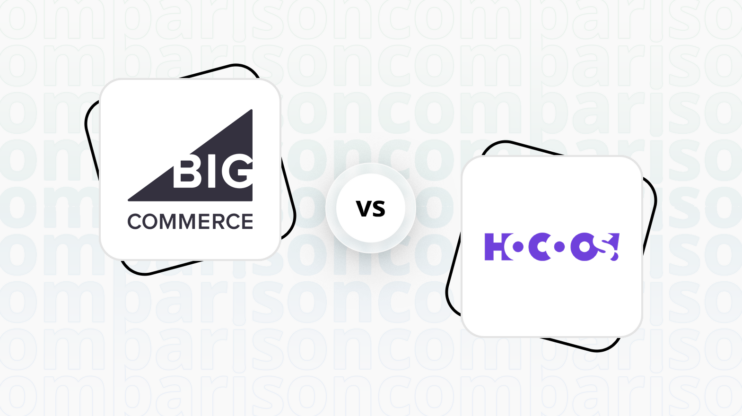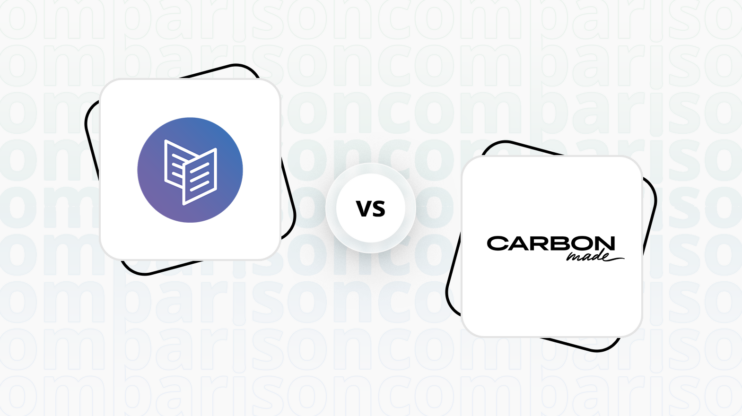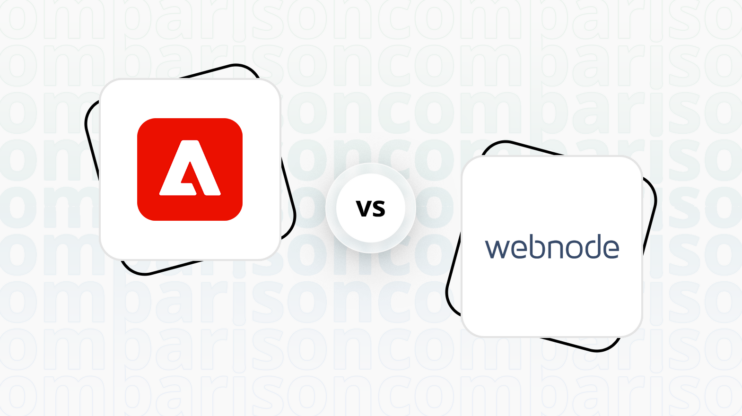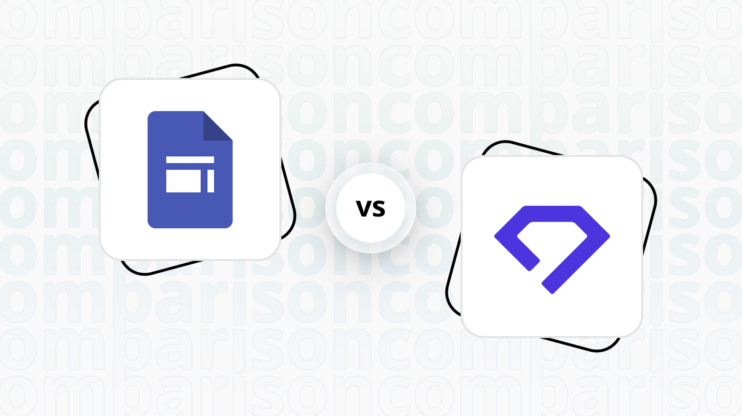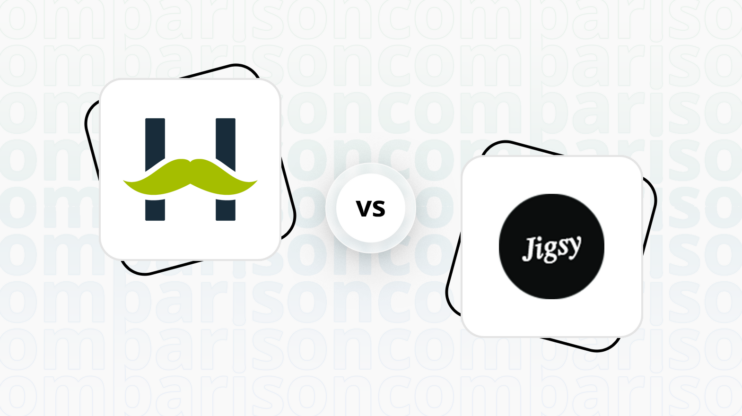Final verdict
Elementor and BigCommerce both offer powerful platforms, but they cater to different needs and user bases.
-
Elementor (Overall Grade: 7.4/10)
is a versatile website builder plugin for WordPress, known for its flexibility and extensive design functionalities. It excels in providing a user-friendly interface, making it easy for both beginners and professionals to create visually appealing websites. Elementor’s integration with WooCommerce allows for robust ecommerce capabilities, although it may not match the depth of BigCommerce’s ecommerce features. When comparing Elementor vs BigCommerce, Elementor stands out for its design flexibility and ease of use. -
BigCommerce (Overall Grade: 7.9/10)
is a comprehensive ecommerce platform designed for businesses looking to scale their online presence. It offers a wide range of built-in features, including advanced SEO tools, various payment gateway integrations, and multi-channel selling capabilities. BigCommerce’s robust ecommerce functionalities, combined with its extensive support resources, make it a strong choice for merchants. In the Elementor vs BigCommerce comparison, BigCommerce excels in ecommerce capabilities and customer support.

|

|
|
|---|---|---|
|
Design functionalities & templates |
9.2 |
7.8 |
|
Ease of use |
8.8 |
7.3 |
|
Ecommerce |
7.6 |
9.0 |
|
Website Editors |
8.5 |
7.9 |
|
Product testing options |
5.6 |
7.3 |
|
Price |
8.0 |
7.4 |
|
Hosting quality |
7.8 |
7.8 |
|
Website speed optimization |
6.7 |
7.6 |
|
Plugins and integrations |
7.6 |
7.7 |
|
Marketing features |
7.8 |
7.9 |
|
Customer support |
7.2 |
8.7 |
|
Security |
9.1 |
8.9 |
|
AI capabilities |
7.4 |
7.3 |
|
User Management |
8.8 |
8.9 |
| Overall |
7.4 |
7.9 |
Best for ecommerce
 7.6
7.6
 9.0
9.0
Verdict
: BigCommerce is the superior choice for comprehensive ecommerce needs, while Elementor offers flexibility and customization for WordPress users.
-
Elementor
: Known for its seamless integration with WooCommerce, Elementor provides a range of ecommerce-specific widgets and customizable product pages. It is ideal for users who prefer the flexibility of WordPress and need a highly customizable solution. However, in the Elementor vs BigCommerce comparison, Elementor’s ecommerce capabilities are slightly less robust, scoring 7.6. -
BigCommerce
: With a score of 9.0, BigCommerce excels in providing a comprehensive set of built-in ecommerce features, including advanced SEO tools, various payment gateway integrations, and multi-channel selling capabilities. It is perfect for businesses looking to scale their online presence with a user-friendly interface and extensive support resources.
Best for informational & business websites
 8.9
8.9
 7.5
7.5
Verdict
: Elementor is the superior choice for informational business websites, offering extensive design flexibility and ease of use, while BigCommerce, though capable, is more tailored for ecommerce needs.
-
Elementor
: Elementor shines in creating visually appealing and highly customizable informational websites. Its drag-and-drop interface, combined with a wide range of widgets and templates, makes it an excellent choice for both beginners and professional web designers. The platform’s flexibility and integration with WordPress themes and plugins enhance its functionality, making it ideal for businesses looking to establish a strong online presence without delving into code. With a score of 8.9, Elementor stands out for its user-friendly design and robust customization options. -
BigCommerce
: While BigCommerce is a powerful ecommerce platform, it can also be used for informational websites. However, its extensive set of ecommerce features may be overwhelming for those primarily seeking to create a business website without a focus on online sales. BigCommerce offers a variety of customizable templates and a user-friendly interface, but its strengths lie in its ecommerce capabilities, such as advanced SEO tools and multi-channel selling. With a score of 7.5, BigCommerce is a solid choice for businesses that may eventually expand into ecommerce but is less suited for purely informational sites compared to Elementor.
Detailed comparison
Design functionalities & templates
Design FunctionalitiesRepresents how well each platform allows for creative design and customization of websites.Score Components:
- Template Variety (30%): Range and quality of design templates.
- Customization (30%): Flexibility and options for design alterations.
- User Interface (20%): Ease and intuitiveness of the design process.
- Responsiveness (10%): Adaptability to different devices and screen sizes.
- Innovation (10%): Unique design features and tools.
 9.2
9.2
 7.8
7.8
🏆
Winner: Elementor.
If you’re looking for a platform that offers more creative control and a wide array of design features, Elementor is the preferred choice.
Elementor offers an extensive range of templates and designs, with over 100 responsive website kits covering various categories like business, creative, education, and more, directly available through Elementor’s platform. Additional sources like Envato Elements, Template Monster, and others provide a wider selection, including free and premium options, catering to diverse web design needs.


Compared to Elementor, BigCommerce offers a variety of design templates for creating ecommerce websites, with a total of 240 themes available. Most of these themes come with up to four styling options, providing users with flexibility in design choices to match their brand’s aesthetic. There are 12 free themes, while the rest range in price from $150 to $300 each.
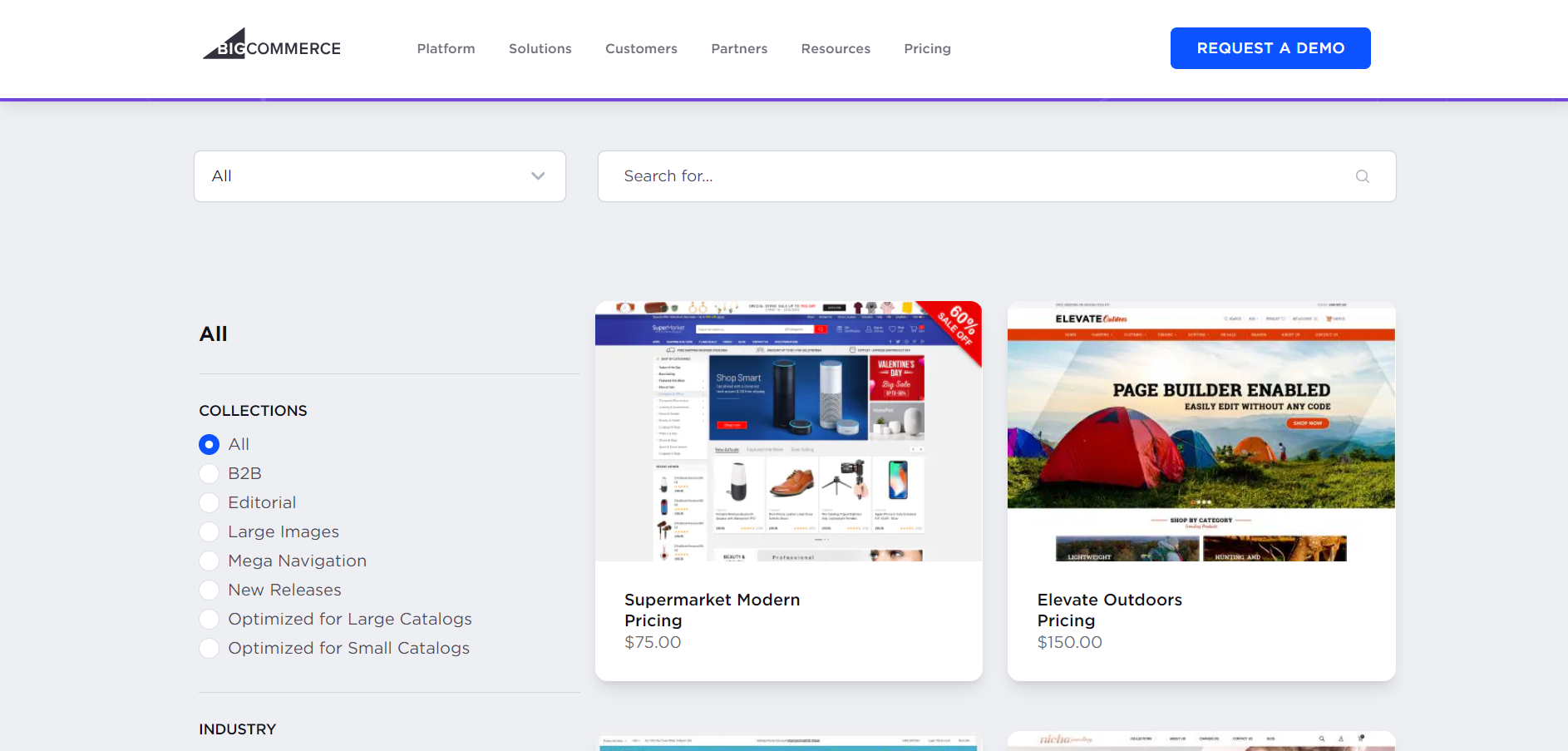
Get a head start on website creation with AI
Create a custom website tailored to your business needs 10X faster with 10Web AI Website Builder!
Ease of use
Ease of useReflects the platform’s overall user-friendliness.Score
Components:
- Learning curve (40%): Quickness and ease of getting started.
- Interface design (30%): Simplicity and intuitiveness of layout.
- User guidance (20%): Quality of tutorials and support.
- Flexibility (10%): Adaptability to various user skills.
 8.8
8.8
 7.3
7.3
🏆 Winner: Elementor
. Scoring an impressive 8.8, Elementor is renowned for its user-friendly interface, enabling both novices and professionals to create websites with ease. BigCommerce, with a score of 7.3, offers a robust platform but can be overwhelming for beginners due to its wide array of features and pricing. If ease of use is a priority, Elementor is the clear winner in this category.
Learning Resources
🏆 Winner: Tie
. Both Elementor and BigCommerce offer extensive learning resources suitable for both beginners and advanced users. Elementor provides an array of resources through its Elementor Academy, while BigCommerce offers a wide range of resources designed to support e-commerce businesses at various stages of growth.
For ecommerce
EcommerceMeasures the platform’s effectiveness in supporting online business activities.Score Components:
- Ecommerce themes and templates (20%): Variety and design of templates.
- Product management (25%): Ease of managing and organizing products.
- Payment options (25%): Variety and convenience of payment methods.
- Ecommerce features (20%): Features for managing an ecommerce store.
- Integration (10%): Compatibility with external e-commerce tools and services.
 7.6
7.6
 9.0
9.0
When it comes to ecommerce, BigCommerce is a comprehensive platform that offers a wide array of features, including extensive POS integrations, a variety of shipping options, and a selection of over 100 mobile-responsive themes for design customization. On the other hand, Elementor offers robust ecommerce capabilities through its seamless integration with WooCommerce, providing customizable product pages, a variety of ecommerce-specific widgets, and responsive design templates for building online stores.

|

|
|
|---|---|---|
|
Ecommerce themes and templates |
7.8 |
8.0 |
|
Product page customization |
8.4 |
8.3 |
|
Payment processing and commissions |
7.5 |
9.2 |
|
POS capabilities |
5.5 |
8.5 |
|
Payment gateways |
7.0 |
9.0 |
|
Product numbers |
7.0 |
9.5 |
|
Additional ecommerce features |
8.0 |
8.4 |
Elementor ecommerce features:
- WooCommerce Integration
- Customizable Product Pages
- Ecommerce Widgets
- Product Categories and Filters
- Shopping Cart Customization
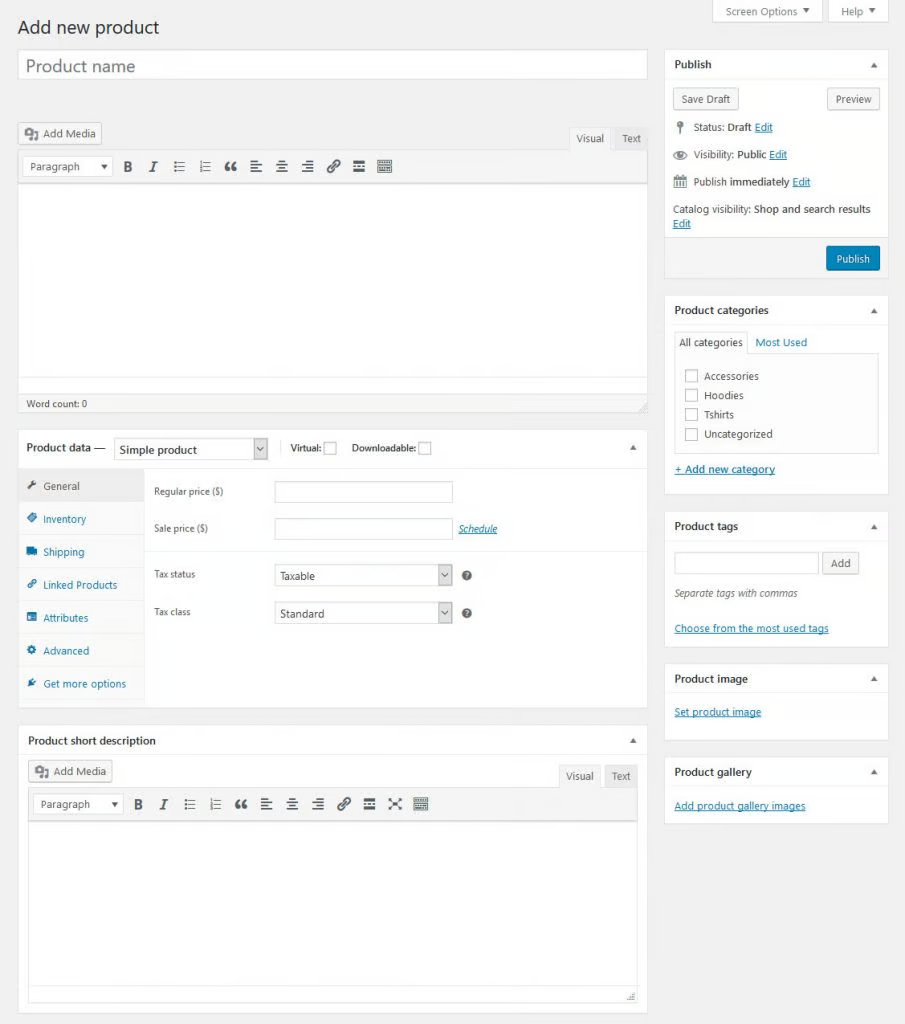
BigCommerce ecommerce features:
- Unlimited Products
- Streamlined Single-Page Checkout
- Order Management
- Abandoned Cart Recovery
- Marketing and Sales Tools
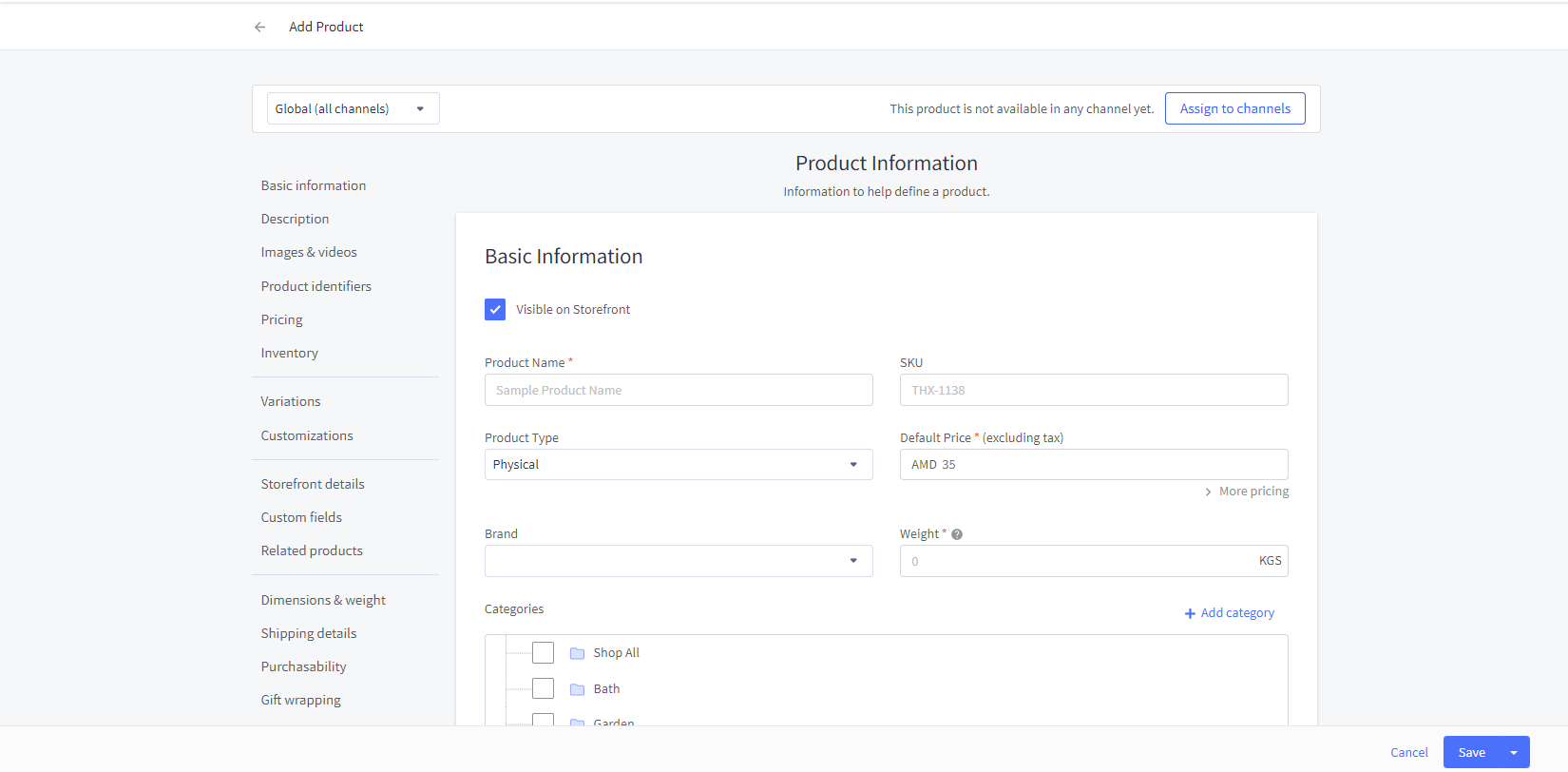
Ecommerce themes & templates
Elementor offers a diverse range of ecommerce-specific templates suitable for various online stores, from free options for budget-conscious users to premium templates with advanced customization features. These templates are designed to be mobile-responsive and SEO-friendly, ensuring optimal performance across devices and search engines. BigCommerce provides a wide variety of eCommerce templates designed to enhance online shopping experiences and cater to different industries. These templates feature advanced functionalities like quick view, product suggestions, and complex search filters but may require performance optimization for maintaining speed.
Product page customization
Elementor offers extensive customization options for WooCommerce product pages, including custom layouts, WooCommerce widgets for various product elements, and options for styling product galleries and ‘Add to Cart’ buttons. It allows for the display and customization of product variants, although the number of variants is technically limited by WooCommerce, not Elementor. In BigCommerce, you can extensively customize product pages to enhance customer experience and improve sales. This includes the ability to create detailed product variants, customize options like custom fields, and upload multiple images or videos for each product.
Payment processing
Elementor supports several payment gateways, notably through plugins and integrations, with Stripe and PayPal being prominent options for simple and widespread use. These gateways charge their own transaction fees, typically around 2.9% + $0.30 per transaction, but Elementor itself does not impose additional fees for transactions. BigCommerce supports over 65 pre-integrated online payment solutions, serving customers across 230 countries with more than 140 currencies, without charging additional transaction fees for using third-party payment gateways. This approach provides merchants with the flexibility to choose the best payment solution for their business needs, including the option for custom integration to cater to specific regional payment preferences.
Website Editors
Website EditorsEvaluates the platforms’ website building and editing capabilities.Score Components:
- Customization tools (40%): Range and power of editing features.
- Editor usability (30%): User experience within the editor.
- Design flexibility (20%): Freedom in layout and design changes.
- Update and maintenance ease (10%): Simplicity of updating and maintaining the site.
 8.5
8.5
 7.9
7.9
🏆
Winner: Elementor
. Elementor, with a score of 8.5, offers a popular website builder plugin for WordPress that allows users to create and edit websites through a visual drag-and-drop interface. It offers a wide range of widgets and templates, enabling users to design their sites without needing to write code. Elementor is known for its flexibility, allowing for the customization of every detail on a webpage, making it suitable for both beginners and professional web designers.
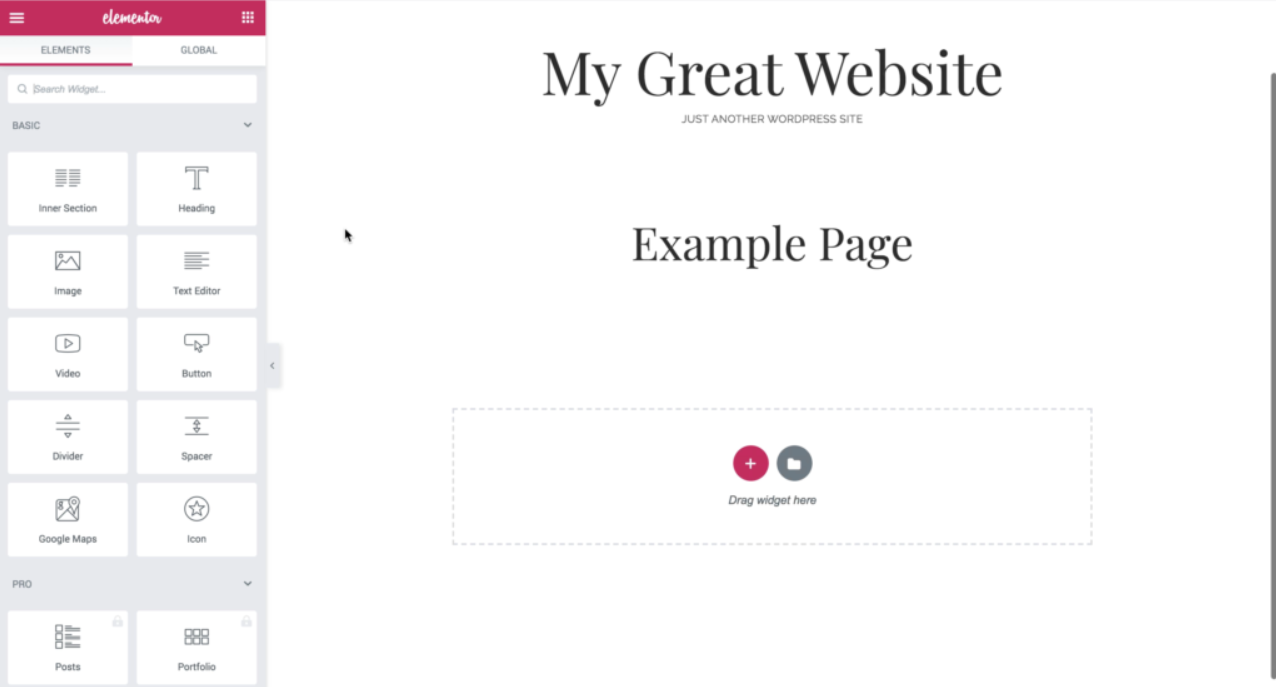
BigCommerce’s editor, scoring 7.9, offers an extensive set of tools designed for creating professional and engaging online stores without requiring coding knowledge. It provides a user-friendly drag-and-drop interface, robust eCommerce capabilities including product management and secure payment processing, and customizable templates to match brand aesthetics. The platform also features powerful SEO and marketing tools, app integrations for extended functionality, and comprehensive analytics to track website performance.
Mobile editor/app
 0
0
 7.5
7.5
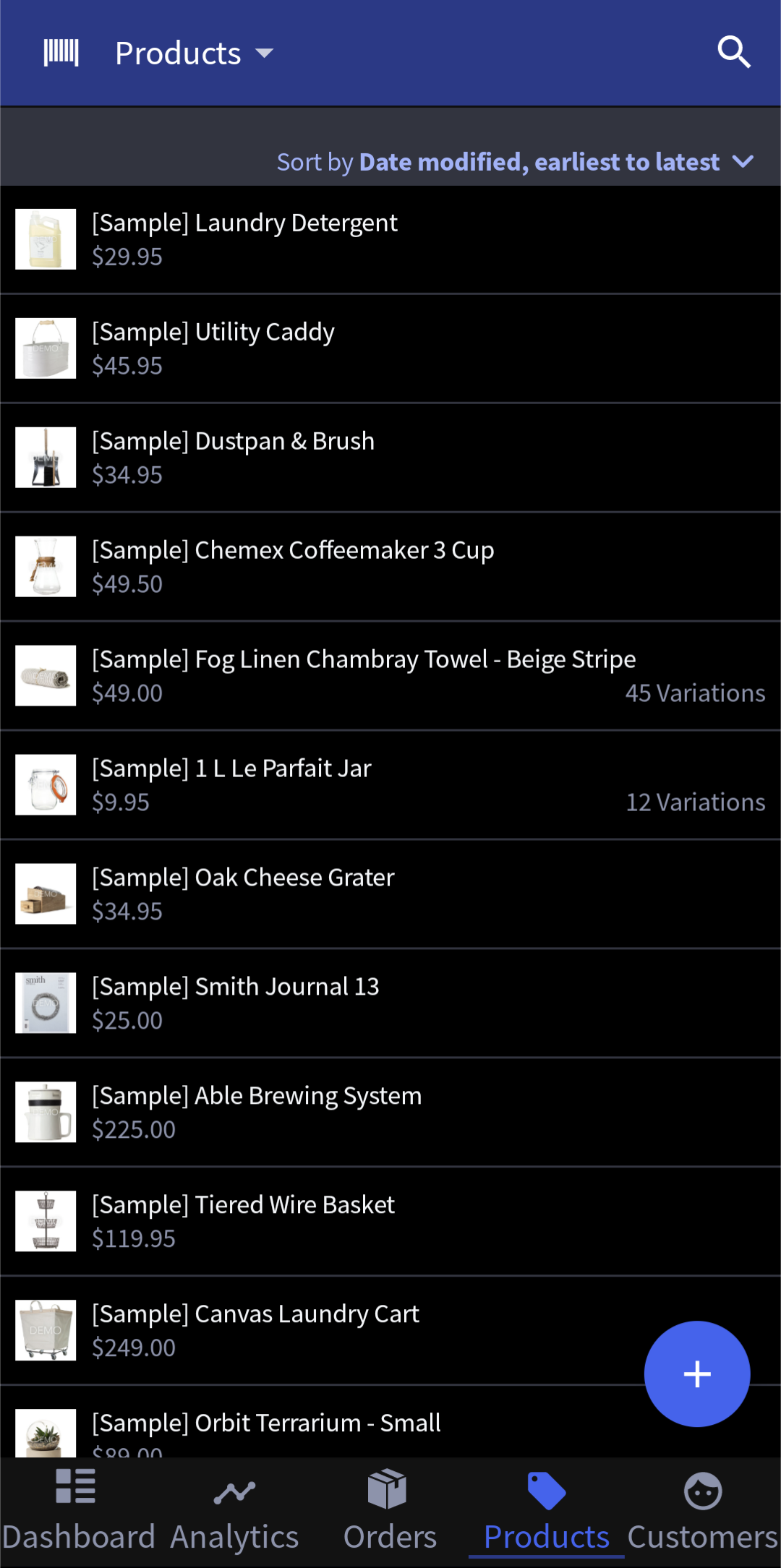
🏆
Winner: BigCommerce
. Both Elementor and BigCommerce offer mobile apps for managing your website, but they cater to different needs and skill levels. Elementor does not have a dedicated mobile editor, which limits its usability for on-the-go website management.
On the other hand, BigCommerce does have a mobile app, but it does not allow for website editing. It only provides access to the dashboard, analytics, orders, and the possibility to add or edit products. This makes it more suitable for managing an online store on the go, but less ideal for making significant changes to the website’s design or layout.
In summary, BigCommerce wins this category due to its mobile app, even though its mobile editing capabilities are limited.
Product testing options
Product Testing OptionsAssesses the options for trying out platform features before commitment.Score Components:
- Trial quality (40%): Extent and usefulness of the trial or free version.
- Feature accessibility (30%): How many features are available to test.
- Trial duration (20%): Length of the trial period.
- Ease of transition (10%): Smoothness of moving from trial to paid plans.
 5.6
5.6
 7.3
7.3
Overall Result
:
BigCommerce Wins
. BigCommerce scores 7.3, offering a 14-day free trial where users can test premium features. Elementor, scoring 5.6, offers a free version for self-hosted WordPress.org and a 30-day money-back guarantee, but it doesn’t provide a trial version.

|

|
|
|---|---|---|
|
Free Plan |
Yes, but only for self-hosted WordPress.org | No |
|
Trial Duration |
No |
14 days |
|
Testing Premium Features |
It is possible to test all the premium features during the refundable period. |
It is possible to test the premium features during the free trial period. |
|
Money Back Guarantee |
30-day money back guarantee |
No |
Price
PriceLooks at the cost-effectiveness and value for money of each platform.Score Components:
- Plan value (40%): What each pricing tier offers.
- Transparency and clarity (30%): Clearness of pricing structures.
- Flexibility of plans (20%): Range of options to suit different budgets.
- Hidden costs (10%): Additional expenses not included in the plan.
 8.0
8.0
 7.4
7.4
Elementor and BigCommerce offer different pricing structures, with Elementor providing more affordable options for smaller scale operations, while BigCommerce caters to larger businesses with its robust ecommerce features.

|

|
|
|---|---|---|
|
$0-$10 |
Basic ($9.99/month): 1 website, with 10GB SSD storage, 25k monthly visitors, 30GB monthly bandwidth, daily auto backups stored for 14 days, Cloudflare CDN, and integrated caching tool. Value for price: 6.5 |
No offering at this amount. |
|
$10-$20 |
Business ($19.99/month): 1 website, with 20GB SSD storage, 50k monthly visitors, 50GB monthly bandwidth, daily auto backups stored for 30 days, Cloudflare CDN, integrated caching tool and access to staging environment. Value for price: 7.5 |
No offering at this amount. |
|
$20-$30 |
Grow ($22.99/month): 3 websites, with 30GB SSD storage, 75k monthly visitors, 75GB monthly bandwidth, daily auto backups stored for 30 days, Cloudflare CDN, integrated caching tool, access to staging environment and site cloning. Value for price: 8.5 |
No offering at this amount. |
|
$30-$50 |
Scale ($49.99/month): 10 websites, with 40GB SSD storage, 100k monthly visitors, 100GB monthly bandwidth, daily auto backups stored for 30 days, Cloudflare CDN, integrated caching tool, access to staging environment and site cloning. Value for price: 9.0 |
Standard ($39.00/month): Unlimited products, file storage, and bandwidth, suitable for small businesses. Limited to $50k in online sales per year and up to 4 inventory locations. Value for price: 7.0 |
|
$100-$200 |
No offering at this amount. |
Plus ($105.00/month): Includes Standard features, plus customer segmentation and abandoned cart saver. Limited to $180k in online sales per year and up to 5 inventory locations. Value for price: 7.5 |
|
$300+ |
No offering at this amount. |
Pro ($399.00/month): All Plus features, plus Google customer reviews and advanced search filters. Limited to $400k in online sales per year, and up to 8 inventory locations. Additional $150/month for every $200k in online sales. Value for price: 8.0 |
location. As a result in rare cases the prices displayed here can differ from the ones you see on their
websites.
Hosting quality
Hosting
qualityExamines the reliability and performance of the hosting solutions.Score Components:
- Uptime (40%): Consistency and reliability of website availability.
- Speed (30%): Loading times and performance.
- Bandwidth and storage (20%): Sufficiency of resources provided.
- Data centers (10%): Quality and distribution of hosting infrastructure.
 7.8
7.8
 7.8
7.8
Winner: Tie
. Both Elementor and BigCommerce offer reliable hosting services with 99.9% uptime. Elementor provides Google Cloud powered hosting with daily auto backups, while BigCommerce offers scalable cloud hosting with unlimited storage and bandwidth. However, BigCommerce has a slightly higher uptime guarantee of 99.99%.

|

|
|
|---|---|---|
|
Do they offer hosting? |
Yes, included in all their plans |
Yes, scalable cloud hosting |
|
Data Centers: |
1 data center in Belgium |
Not disclosed |
|
Type of hosting: |
Managed WordPress Hosting |
Cloud Hosting |
|
Uptime: |
99.9% |
99.9% |
|
Uptime Guarantee: |
Yes, 99.9% |
Yes, 99.99% |
Website Speed Optimization
Website Speed OptimizationEvaluates optimization of website loading timesScore Components:
- PageSpeed Score (30%): Google’s score indicating performance optimization.
- Loading Time (30%): The average time until a website is fully interactive.
- Mobile Optimization (15%): Optimization effectiveness for mobile devices.
- Resource Optimization (15%): Optimizing images, scripts, and other heavy resources.
- CDN Usage (10%): Use of CDN to enhance speed across geolocations.
 6.7
6.7
 7.6
7.6
🏆 Winner: BigCommerce
Both Elementor and BigCommerce have strategies in place for website speed optimization, but BigCommerce takes the lead with its robust set of tools for Core Web Vital improvements.

|

|
|
|---|---|---|
|
Focus |
Lazy Loading, Code Minification, Caching, CDN |
Image Optimization, Code minification, Optimized templates, Using AMP, Caching |
|
Performance Tools |
Not specified |
Not specified |
|
Key Strategies |
Lazy Loading, Code Minification, Caching, CDN |
Image Optimization, Code minification, Optimized templates, Using AMP, Caching |
|
Load Times |
Varies depending on optimization and website complexity |
Varies depending on optimization and website complexity |
|
Page Speed Scores Range |
Varies depending on optimization and website complexity |
Varies depending on optimization and website complexity |
|
Core Web Vitals Improvement |
Not disclosed |
Provides users with many tools for CVW improvements |
Elementor, a popular website builder plugin for WordPress, focuses on strategies such as lazy loading, code minification, caching, and CDN for website speed optimization. However, it does not disclose any information about its Core Web Vitals improvements. The load times and PageSpeed scores vary depending on optimization and website complexity.
On the other hand, BigCommerce, a comprehensive e-commerce platform, offers a wide range of strategies for website speed optimization, including image optimization, code minification, optimized templates, using AMP, and caching. It also provides users with many tools for Core Web Vitals improvements. Similar to Elementor, the load times and PageSpeed scores of BigCommerce also vary depending on optimization and website complexity.
Get a head start on website creation with AI
Create a custom website tailored to your business needs 10X faster with 10Web AI Website Builder!
Plugins and integrations
Plugins and integrationsMeasures the range and effectiveness of additional plugins and integrations.Score Components:
- Variety of options (40%): Range of available add-ons.
- Integration smoothness (30%): Ease of integrating plugins into the site.
- Quality of plugins (20%): Functionality and reliability of the options.
- Custom integration capabilities (10%): Support for custom or third-party integrations.
 7.6
7.6
 7.7
7.7
🏆 Winner: BigCommerce.
With a score of 7.7, BigCommerce slightly edges out Elementor, which scores 7.6. BigCommerce offers a wide array of apps and integrations, including ERP and CRM systems, 3PL services, POS systems, and various marketing tools, to enhance eCommerce functionalities. These integrations facilitate operations like sales analytics, inventory management, customer relationship management, and marketing automation.
On the other hand, Elementor add-ons extend the functionality beyond the base version, offering advanced widgets, modules, and complete theme building capabilities for deep customization. They enable superior integration with WooCommerce, third-party services, and provide advanced marketing tools to enhance conversions and user engagement. However, the slight edge in score and the robust set of built-in features make BigCommerce the winner in this category.
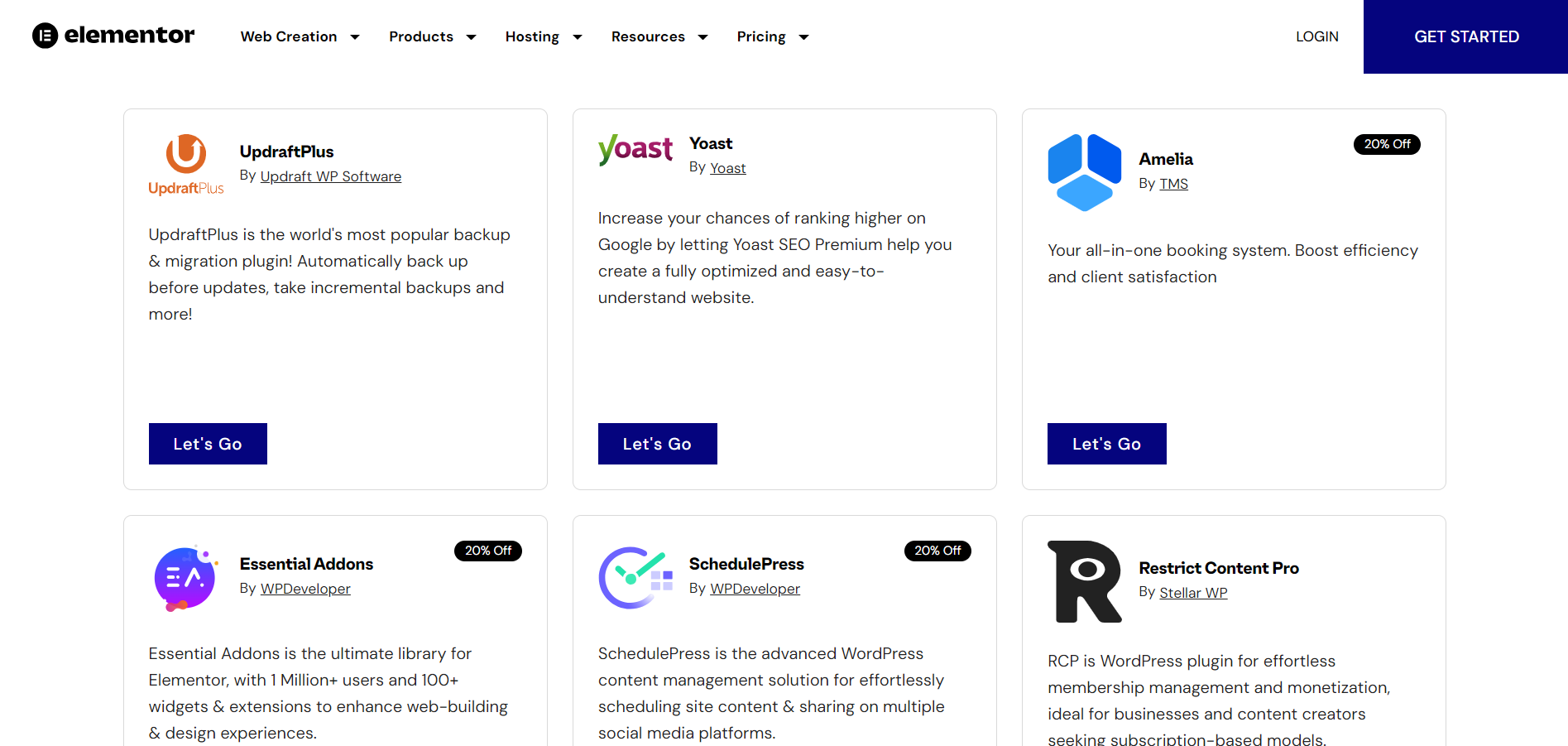
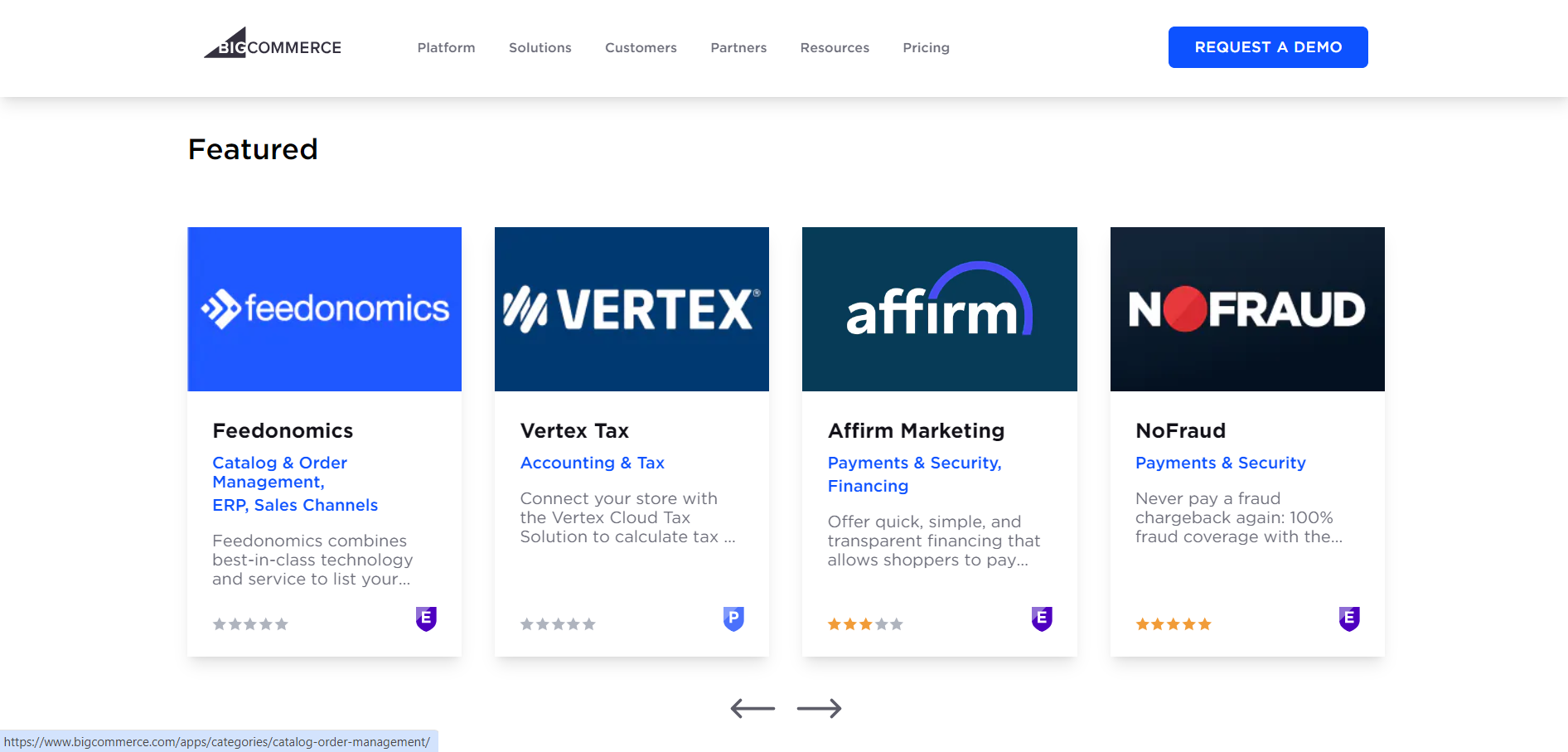
Marketing Features
Design FunctionalitiesRepresents how well each platform allows for creative design and customization of websites.Score Components:
- Template Variety (30%): Range and quality of design templates.
- Customization (30%): Flexibility and options for design alterations.
- User Interface (20%): Ease and intuitiveness of the design process.
- Responsiveness (10%): Adaptability to different devices and screen sizes.
- Innovation (10%): Unique design features and tools.
 7.8
7.8
 7.9
7.9
🏆
Overall Winner: BigCommerce
. BigCommerce edges out Elementor with a slightly higher score, offering comprehensive SEO features, robust analytics and reporting, and extensive social media integration. Elementor, while strong in its own right, particularly in terms of flexibility and customization, falls slightly short in comparison.

|

|
|
|---|---|---|
|
SEO Tools |
Yes, with integration of various SEO plugins |
Yes |
|
Email Marketing |
Yes, with integration of various email marketing services |
Yes, with integration of various email marketing services |
|
Blogging |
Yes |
Yes |
|
Social Media Integration |
Yes, integration of social media buttons |
Yes |
|
Analytics and Reporting |
Yes, with integration of Google Analytics |
Yes |
|
Ads and Promotions |
Yes |
Yes, through third-party integrations |
Customer Support
Customer supportEvaluates the quality and availability of support options.Score Components:
- Response time (40%): Speed of support responses.
- Support quality (30%): Effectiveness and helpfulness of the support.
- Availability (20%): Range of support channels (phone, chat, email).
- Resource richness (10%): Quality of self-help and educational materials.
 7.2
7.2
 8.7
8.7
🏆 Winner: BigCommerce
. In the comparison of Elementor vs BigCommerce, BigCommerce stands out with its comprehensive 24/7 customer support through phone, email, and live chat. The platform’s dedicated phone lines for various regions and the requirement of a support pin for personalized assistance highlight its commitment to user satisfaction. Additionally, BigCommerce’s extensive knowledge base and active community forums provide users with ample resources to resolve issues independently.
Elementor, while offering 24/7 support via ticketing and live chat, does not provide the same level of enterprise support as BigCommerce. However, Elementor’s global Customer Experience agents ensure that users can access support at any time, making it a reliable option for continuous assistance. Despite this, BigCommerce’s robust support system and higher customer support score make it the superior choice in this category.
Security
SecurityLooks at the platforms’ security measures and data protection.Score Components:
- Data protection (40%): Safeguards for user and customer data.
- SSL and encryption (30%): Implementation of secure connections.
- Compliance (20%): Adherence to industry security standards.
- Regular updates (10%): Frequency of security updates and patches.
 9.1
9.1
 8.9
8.9
🏆
Winner: Elementor
. Elementor edges out BigCommerce with a slightly higher security score. Elementor leverages Google Cloud’s infrastructure for high security, including end-to-end encryption. It also employs both active and passive security measures, including 24/7 monitoring, regular updates, backups, and specialized security protocols to protect against common threats. Elementor’s commitment to security is further emphasized by its ISO 27001 certification and a proactive Bug Bounty program.
BigCommerce also prioritizes data privacy and security by adhering to international regulations like GDPR and CCPA, employing data encryption for transmissions and at-rest storage, and hosting on secure data centers with robust access control. However, the responsibility for maintaining security also extends to merchants, who are advised to follow strong security measures on their end.
AI Capabilities
AI capabilitiesMeasures the effectiveness of AI-driven features and tools.Score Components:
- Automation efficiency (40%): Impact of AI on streamlining processes.
- Personalization (30%): AI-driven customization for users or customers.
- AI-Assisted design (20%): Role of AI in website design and functionality.
- Data analysis (10%): Use of AI in interpreting user data and analytics.
 7.4
7.4
 7.3
7.3

|

|
|
|---|---|---|
|
AI Builder |
Elementor AI builder generates text, custom codes, and images |
|
|
AI Ecommerce features |
AI-driven features for eCommerce websites |
AI powered apps integration for personalized product recommendations, AI on-site search, and AI powered chatbots |
|
AI Content Generation |
AI content generation capabilities |
Integrated AI content generation features |
|
Additional AI features |
Integration of third-party AI powered WordPress plugins or widgets |
AI technology to enhance ecommerce operations |
🏆 Winner: Elementor
. Elementor, with a score of 7.4, utilizes AI to enhance the website creation process and provides AI-driven features for eCommerce websites. It also offers AI content generation capabilities and allows the integration of third-party AI powered WordPress plugins or widgets.
BigCommerce, scoring 7.3, does not have an AI website builder but offers AI-powered apps integration for personalized product recommendations, AI on-site search, and AI powered chatbots. It also has integrated AI content generation features and additional AI features to enhance ecommerce operations.
User Management
User ManagementAssesses the platforms’ capabilities in managing user roles, permissions, and accessibility.Score Components:
- Role Customization (40%): Flexibility in creating and defining user roles and
permissions. - Ease of Management (30%): User interface and tools for managing users.
- Access Control (20%): Effectiveness of access control measures for different user
levels. - Scalability (10%): Ability to manage a growing number of users efficiently.
 8.8
8.8
 8.9
8.9
🏆 Winner: BigCommerce
. Both Elementor and BigCommerce offer robust user management features, but BigCommerce edges out with a slightly higher score.
- Elementor’s user management is tied to WordPress roles and permissions, with Administrators having full access, Editors managing posts and pages, and Authors and Contributors having limited capabilities. Elementor Pro offers a Role Manager feature for further customization.
- BigCommerce allows an unlimited number of staff accounts with various roles and permissions, including Sales Staff, Sales Manager, Store Administrator, Store Owner, and Custom roles.
Elementor User Roles and Access Levels:
| Role | Description | Access Highlights |
|---|---|---|
| Administrator | Users with full access to all administration features, including Elementor settings. | Can edit all content, Access to Elementor settings, Can install plugins and themes, Can manage users |
| Editor | Users who can manage and publish content including pages and posts. | Can edit pages/posts created with Elementor, Cannot access Elementor settings, Can manage categories, tags, and links, Can moderate comments |
| Author | Users who can publish and manage their own posts. | Can create posts with Elementor, Cannot edit pages, Limited access to media library, Cannot access Elementor settings |
| Contributor | Users who can write and manage their own posts but cannot publish them. | Can create content with Elementor, Cannot publish or edit pages, No access to Elementor settings, Submissions require review by higher-level roles |
BigCommerce User Roles and Access Levels:
| Role | Description | Access Highlights |
|---|---|---|
| Sales Staff | Enables all Sales Staff permissions | Manage, edit, and add orders – Finalize manual orders with manual payments – Manage returns, capture funds, and refund orders – Manage and edit customers – Manage and edit product reviews – Manage legacy coupons and promotions – Use Image Manager |
| Sales Manager | Enables all Sales Staff and Sales Manager permissions | Includes Sales Staff permissions – Manage, create, edit, and delete products – Manage product options and categories – Export orders – Manage customer store credit and export customers – Manage blogs, brands, and various reports (Ecommerce Analytics reports, abandoned cart reports, etc.) – Edit inventory and manage channels |
| Store Administrator | Enables all Sales Staff, Sales Manager, and System Admin permissions | Includes Sales Staff and Sales Manager permissions – Manage users and form fields – Manage settings (product filtering, store settings, checkout, inventory, order notifications, etc.) – Manage payments, shipping, and tax settings – Import catalog entities and customers – Access store design tools and Page Builder – Manage customer groups – Take store down for maintenance |
| Store Owner | Includes all permissions and is the person financially responsible for the account; this role has exclusive access to various account-related features. | Full access to all permissions and features across the platform – Exclusive access to account-related features and settings not available to other roles |
| Custom | Use this option to create your own combination of permissions. You can also opt to customize one of the other roles. | Customize permissions based on specific needs – Mix and match permissions from different roles to create a unique role with tailored access |
Additional Features

|

|
|
|---|---|---|
|
SSL Certificate |
|
|
|
Custom Domain |
|
|
|
Free Custom Domain Included |
|
|
|
International Domains |
|
|
|
Mobile Responsive |
|
|
|
Page Speed |
|
|
|
Website Builder Mobile App |
|
|
|
Convert a Website To An App |
|
|
|
Website Analytics |
|
|
|
Multilingual Sites |
|
|
|
Multiple Users |
|
|
User Feedback
Elementor is widely appreciated for its intuitive drag-and-drop interface, enabling rapid creation of professional and responsive websites without coding skills. It offers a vast range of templates and compatibility with WordPress, making it a go-to for diverse users. Despite its benefits, concerns arise regarding website loading times, subscription costs, and occasional compatibility issues. Feedback on customer support and legacy plan management is mixed, with some users experiencing dissatisfaction. Overall, Elementor is valued for its efficiency in web development, although some aspects, particularly support services, could be improved.
User feedback on BigCommerce highlights a mix of experiences, with positive remarks on its ease of use, SEO configuration, and strong support team. However, significant criticisms include its lack of suitability for businesses with brick-and-mortar locations, due to issues with POS integration and sales tracking, as well as its inflexibility with customization and additional costs for necessary features. Additionally, concerns were raised about the platform’s steep learning curve for beginners, limitations in product variation and design options, and difficulties with order management. Despite these challenges, some users appreciate the platform’s ability to quickly launch and reliably host stores, alongside its potential for scalability and e-commerce growth.
The making of this blog
We followed a clear, step-by-step process to write and research this article.
FAQ
Which platform is better for ecommerce, Elementor or BigCommerce?
Can I use Elementor for creating an informational or business website?
How do Elementor and BigCommerce compare in terms of design functionalities and templates?
Which platform offers better customer support, Elementor or BigCommerce?
Are Elementor and BigCommerce suitable for beginners?
How do the platforms perform in terms of website speed and optimization?
Which platform is more secure, Elementor or BigCommerce?










